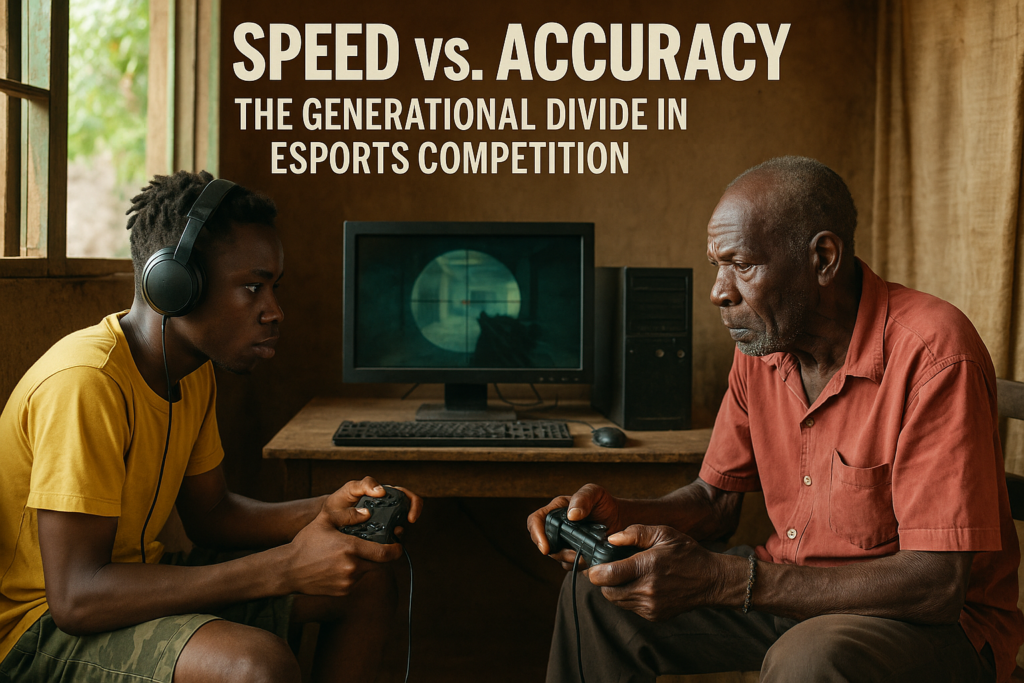Speed vs. Accuracy: The Generational Divide in Esports Competition

Esports competitors face numerous challenges in global tournaments, requiring mastery of game mechanics, strategies, and quick reaction times. The debate over Speed vs. Accuracy highlights the differing approaches between Gen Z and Millennial gamers.

The Critical Role of Speed and Accuracy in Esports
In esports, players must act quickly and accurately. Speed is about how fast they can react and make decisions, while accuracy is about how precise their actions are. Both factors are crucial in competitive gaming, and finding the right balance between them often decides a player’s success and ranking.
Speed: In high-octane titles like Fortnite, Call of Duty, and Apex Legends, players must react swiftly to ever-changing dynamics, from enemy movements to in-game events. Possessing the ability to make rapid yet effective decisions can mean the difference between victory and defeat in the heat of competition.
Accuracy: Conversely, titles such as Counter-Strike: Global Offensive, Valorant, and Overwatch emphasize the necessity of precision. A single missed shot or poorly executed ability could lead to dire consequences for a team, underscoring the importance of accuracy in gameplay.
Gen Z: Championing the Speed-First Mentality Born into a world defined by rapid digital experiences and the lure of instant gratification, Gen Z—those born between 1997 and 2012—approach esports with a pronounced focus on speed. Their gameplay reflects a decisive shift towards swift, instinct-driven actions, often prioritizing speed over accuracy.
Rapid Decision-Making: Gen Z players excel in making quick decisions, often relying on their instincts rather than overthinking their moves. This approach thrives in fast-paced gameplay, where hesitation can result in missed opportunities.
High Sensitivity Settings: Many Gen Z gamers favor high sensitivity settings on their controllers and mice, enabling them to execute rapid movements and track opponents with unmatched agility. While this may lead to occasional inaccuracies, the benefits of speed typically outweigh these missteps in frenetic encounters.
Adaptability: Gen Z players are inherently adaptable, quick to embrace new gaming mechanics and strategies. Their willingness to experiment with diverse playstyles and tactics makes speed their preferred competitive weapon.
Streaming Influence: Platforms such as Twitch and YouTube wield considerable influence over Gen Z esports preferences. The high-energy dynamics of live streams encourage players to create captivating, fast-paced gameplay, where thrilling action takes precedence over slow, deliberate tactics.
Millennials: Prioritizing Accuracy and Strategic Depth
In stark contrast, Millennials—born between 1981 and 1996—developed their skills in an era marked by evolving strategic complexity in gaming. Their approach tends to be more measured and calculated, with a strong emphasis on accuracy and long-term strategic planning.
Thoughtful Strategy: Millennials approach esports with a deeper understanding of intricate strategies, favoring titles that require careful planning and collaboration, such as League of Legends, Dota 2, and Rainbow Six Siege. Their focus on accuracy is a natural extension of this strategic mindset.
Lower Sensitivity Settings: Many Millennials prefer lower sensitivity settings, which permit greater control and precision in their movements. This strategy is paramount in games where accuracy is critical, allowing players to line up shots effectively and seize advantages.
Team Coordination: Millennials value teamwork and communication, strategically collaborating with teammates to execute well-thought-out plans. This emphasis on collective strategy fosters accuracy and ensures each team member plays a pivotal role in achieving success.
Commitment to Improvement: With a focus on continual self-analysis, Millennials are driven to refine their skills and identify areas for growth. This leads to a precision-oriented approach, as they strive to minimize mistakes and enhance their gameplay quality.
Distinct Differences in Gameplay Styles – Pace of Play: While Gen Z thrives in fast-paced, high-energy games that reward swift reflexes and daring gameplay, Millennials favor titles with a slower, more tactical tempo that encourages detailed planning and strategic execution.
Risk vs. Reward: Gen Z is more inclined to embrace high-risk strategies, leveraging their speed to surprise opponents and seize fleeting opportunities. In contrast, Millennials prioritize accuracy and calculated moves, often avoiding risks that may lead to failure.
Skill Development: Millennials typically invest time in mastering specific techniques over the long term, while Gen Z players excel in quickly adapting to new strategies and mechanics, showcasing their versatility.
A Unified Future in Esports
Gen Z’s speed and Millennials’ accuracy shape a dynamic esports landscape. As these generations merge their approaches, they will drive innovation in competitive gaming. Esports will thrive by integrating speed and accuracy, allowing players to excel in an evolving environment. Advancements in technology will enable new ways to harmonize these elements. The future of esports invites everyone to shine, with the best competitors uniting speed and accuracy for an enriched gaming experience.
Writer:Jim Kiambi- EsportsAfricaNews-Kenya




